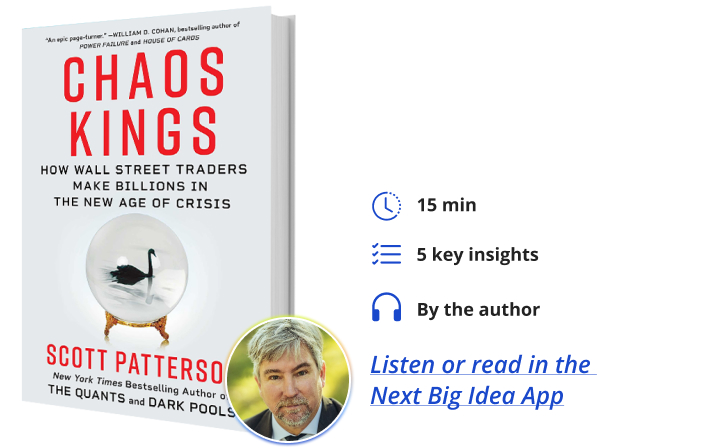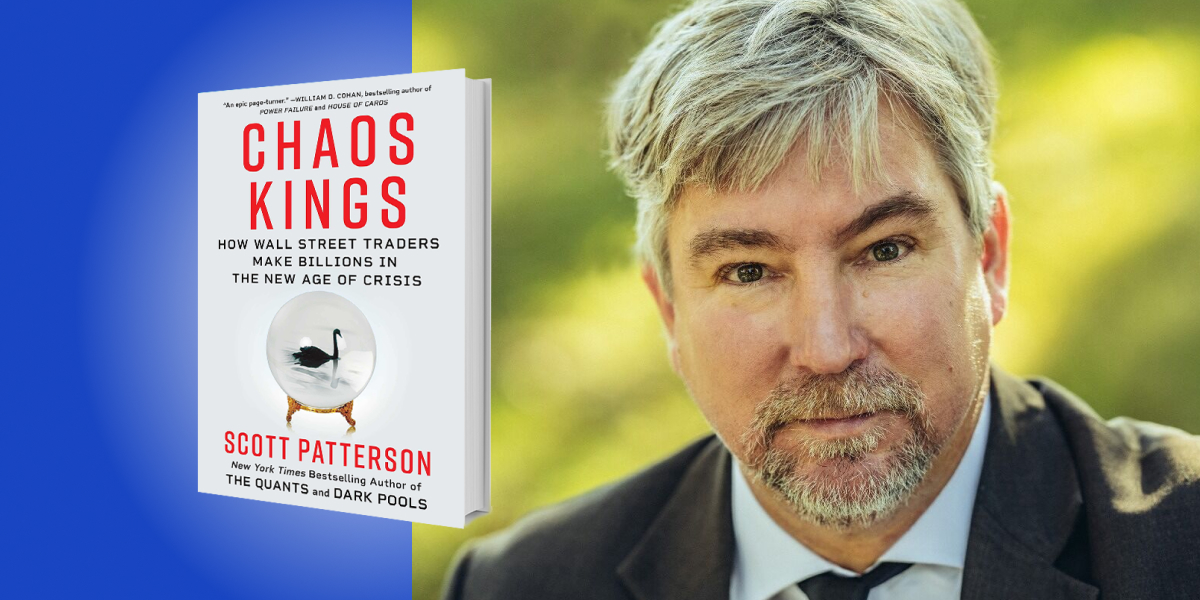Scott Patterson is a New York Times bestselling and award-winning author. He is also a journalist for The Wall Street Journal. He won the Loeb Breaking News Award and has made frequent appearances in the media, including on CNBC, The Daily Show, and Fresh Air.
Below, Scott shares five key insights from his new book, Chaos Kings: How Wall Street Traders Make Billions in the New Age of Crisis. Listen to the audio version—read by Scott himself—in the Next Big Idea App.

1. Don’t lose money.
That’s Warren Buffett’s rule number one for investors. Rule number two: Don’t forget rule number one. Of course, all investors, including the Oracle of Omaha, lose some money from time to time, and that’s fine. What Nassim Taleb and Mark Spitznagel have learned over decades of trading is that the key to successful investing over the long run is to avoid losing a lot of money.
The reason is that it’s really hard to get back to square one. Say you have $100 and you lose $50, or 50 percent of your cash. To get back to $100, you have to make a 100 percent gain. Lose 50 percent, you have to make 100 percent. Those are hard odds to overcome.
Investors need to be vigilant against the risk of a major crash. That is in part what led Nassim Taleb to write his 2007 bestseller The Black Swan. Over decades of trading, he saw time and again so-called “Masters of the Universe” on Wall Street blow up by taking too much risk. They always thought tomorrow would be the same as today, oblivious to the risk of some unforeseen event looming on the horizon—those deadly Black Swans.
2. Play it safe.
Most people on Wall Street don’t make money by investing—they make money by helping others invest, charging a hefty fee for their service. Warren Buffett called these people the “helpers,” and warned investors to avoid them at all costs.
The reason: very few people have the skill to beat the market. That is, the performance of the broader market, usually measured by the S&P 500, almost always does better than professional investors over time. Mark Spitznagel recently conducted a review of various trading strategies and found that virtually nothing beat the performance of the S&P 500 over the long run.
“Warren Buffett called these people the “helpers,” and warned investors to avoid them at all costs.”
The helpers, of course, are well aware of this. So, in order to try to be one of the chosen few who beat the market, they take more risk, swinging for more home runs instead of more reliable singles and doubles. That’s what can lead to big losses, though—including the 50 percent crashes Taleb and Spitznagel warn against.
The lesson: Stay away from money managers who charge hefty fees for complex strategies. Stick with simple, safe investments in a portfolio of stocks and bonds.
3. Be humble.
There is a veritable industry of fortune tellers and future watchers on Wall Street trying to read the tea leaves of today’s economy and markets in order to predict what’s coming around the corner. Many are very good at what they do. The problem is that they’re unable to see what really matters. That includes Taleb’s Black Swans, the extreme, unpredictable events that can have a devastating impact on your portfolio that can take years to crawl out of.
It was a lesson Mark Spitznagel learned early on as a trader in Chicago’s famous trading pits in the 1980s. A veteran corn trader who took Spitznagel under his wing told him that, in order to survive, he needed to love to lose. While that might sound like a contradiction to Buffett’s rule number one for investors, it really wasn’t. What the corn trader meant was that Spitznagel needed to love to take small losses—as soon as a trade moved against him, he needed to get out immediately in order to trade another day. That way he avoided the big losses—the career-killing 50 percent crashes.
“While you might believe you’ve got a winning bet, in the short run, the market doesn’t care.”
It was, more than anything, a lesson in humility. While you might believe you’ve got a winning bet, in the short run, the market doesn’t care. It’s a lesson Spitznagel took to heart and follows to this day. Market forecasting doesn’t factor into what he does at his Miami-based hedge fund, called Universa. He freely admits he’s not very good at forecasting whether the market will go up or down in the next six months or year. He doesn’t believe many others are either.
4. Don’t be a trader.
Like Wall Street’s helpers, financial markets are also replete with firms known as market makers that want people to trade—a lot. The reason is that they make a small profit on every trade, win or lose. Their incentive isn’t to get their clients to make money—it’s to get them to trade as often as possible. They want people to trade so much that they’ve made it virtually free to buy and sell stocks.
“Successful investors need to be contrarians, often doing the opposite of what everyone else is doing.”
The problem: Trading is hard. Very hard. While day traders might experience short-term successes, over the long run the odds are seriously stacked against them. It’s very easy to get caught up in fads, to follow the crowd. Successful investors need to be contrarians, often doing the opposite of what everyone else is doing.
This goes for amateur and professional investors alike. Warren Buffett, to prove this point, in 2007 made a wager that a basket of hedge funds wouldn’t beat the S&P 500 over a decade. After 2008, the S&P won the race every year, gaining 126 percent compared to the gain of 36 percent by the hedge funds. Investing “doesn’t require great intelligence, a degree in economics or familiarity with Wall Street jargon,” Buffett wrote in his 2017 letter to Berkshire Hathaway shareholders. “What investors…need instead is an ability to both disregard mob fears or enthusiasms and to focus on simple fundamentals.”
5. Stay cool.
One of the biggest mistakes investors make is selling a big chunk of stocks when things get scary. Many did exactly that in early 2020 when the stock market was crashing amid the fallout from the Covid 19 pandemic. Over the following year, the U.S. stock market, riding a wave of federal bailout funds and monetary stimulus from the Federal Reserve, went on a historic rally.
Being able to stomach market turmoil is one of the primary benefits of Univera, according to Spitznagel. If you know you’re protected from a major crash, you’re more than willing to hold on to your stocks in times of trouble. That prevents clients from making knee-jerk moves that end up being very costly over the long run.
Of course, mom and pop investors don’t have a Universa to provide cover from a crash. That’s why it’s not a bad idea to have some money in bonds or gold, which can cushion the blow. The primary lesson is that investors need to keep their cool, even if they fear a Black Swan is looming on the horizon.
To listen to the audio version read by author Scott Patterson, download the Next Big Idea App today:
































